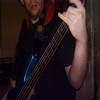Irminsul wrote:That was a fine piece on physics...well done. But the question I am asking is a bit more murky; namely, what is the "music" in the organized sound we call music? How come we can hear one person do a rendition of our favorite song that just falls flat and leaves us emotionless or even pissed off, and another person playing the same song can bring us to tears of joy?
Clearly, something is going on there that cannot be placed on a data chart, or dealt with in a laboratory.
Well, clearly, as you stated before, that is definitely a more esoteric concept. First though, let me say that this avenue is deeper, even spiritual in nature. However, the basic points I addressed still stands I believe. The moment in time exists, and as the light and sound travels through space, it continues to exist, but is "experienced" at differing times, depending on the listener's proximity to the origin of the sounds and images. That alone, I believe, probably negates the merit of the "sinfulness" of recording music.
But on to the much more fascinating question you proposed...
You are almost asking, what is music? What defines it? What is the nature of it? Why does it evoke differing responses? Why is it, that what is "music" to one person's ear, is garbage to someone else's. Is it considered "music" if it evokes a certain response, conforms to a certain standard? Who decides?
Is it a physical reality? A spiritual reality? Both?
It would seem to depend upon the audience. But more profoundly, it seems, at least to me, to depend upon the "relationship" between creator of the art, and it's audience.
For me, music is about making that "connection". In fact, life itself, is about making that connection. If there was a divine architect of our cosmos and the living beings that inhabit it, including ourselves, then this "architect" certainly had "relationship" in mind when it conceived, and then created all that we see and all that we are.
Being "verbose" as I am, those that are interested, will have to forgive me, but there is no short way to express the following synopsis...
I have, even since childhood, been intrigued by the nature of all that exists, and it's interdependency. For example, everyone knows that trees take in carbon dioxide and expel oxygen. People are the reverse. We inhale oxygen and expel carbon dioxide. There is a relationship of interdependence.
Also, for example, what about sight? There is really no such thing as "color" in an absolute sense, meaning being "fixed". Our eyes "interpret" light being reflected off objects as color. It is really our brains that make it "color". As humans, we may see that an object appears "red" whereas certain insects may "see" some shade of ultraviolet, a different color altogether. Who's right? Us? The insect? Well, both are. We each see what we see, based upon our make up and our own unique relationship to the object.
As an interesting aside, the object that we "see" as red, is not only, NOT red, but the very opposite. It is the ABSENCE of the spectrum known as red, that makes the object appear red. The object does not absorb that spectrum of light from the sun, and it is bounced off (rejected) by the object, and THAT is what we see. We assume the object is red (although it is not) and we further assume that when the lights are off, that object is still red. The reality is, that without light shining on it, that object has NO color. And without us watching it with our eyes, there is not a brain to interpret that light as "red" even when the lights ARE on.
So there is a symbiotic realtionship between not only the object itself and light, but of the observer as well. The absence of ANY one of the three, and there is no color.
Higher ancient cultures have often recognized the interdependence of all material things, and science through millenia has only confirmed what on a more primitive scale, some ancients have always known, that all life depends upon other life, in an organic miracle of interdependence.
Music is part of that scenario.
Someone who associates "soft rock" with horrible personal experiences may be repulsed by the same performer that another person gets mushy over. A conservative personality may find that thrash metal is not musical at all, whereas a more adventurous person may find it the only music worth listening to. Music evokes a "call and response". The artist expresses an idea through musical form, but that translates into the listener as either genius or folly, depending on his personality and life experiences.
So, like the example of light and color, so too, is there a symbiotic relationship between inspiration, artist, and his audience.
Without the relationship between inspiration, artist and audience, music itself may not exist.
How's that for deep?


